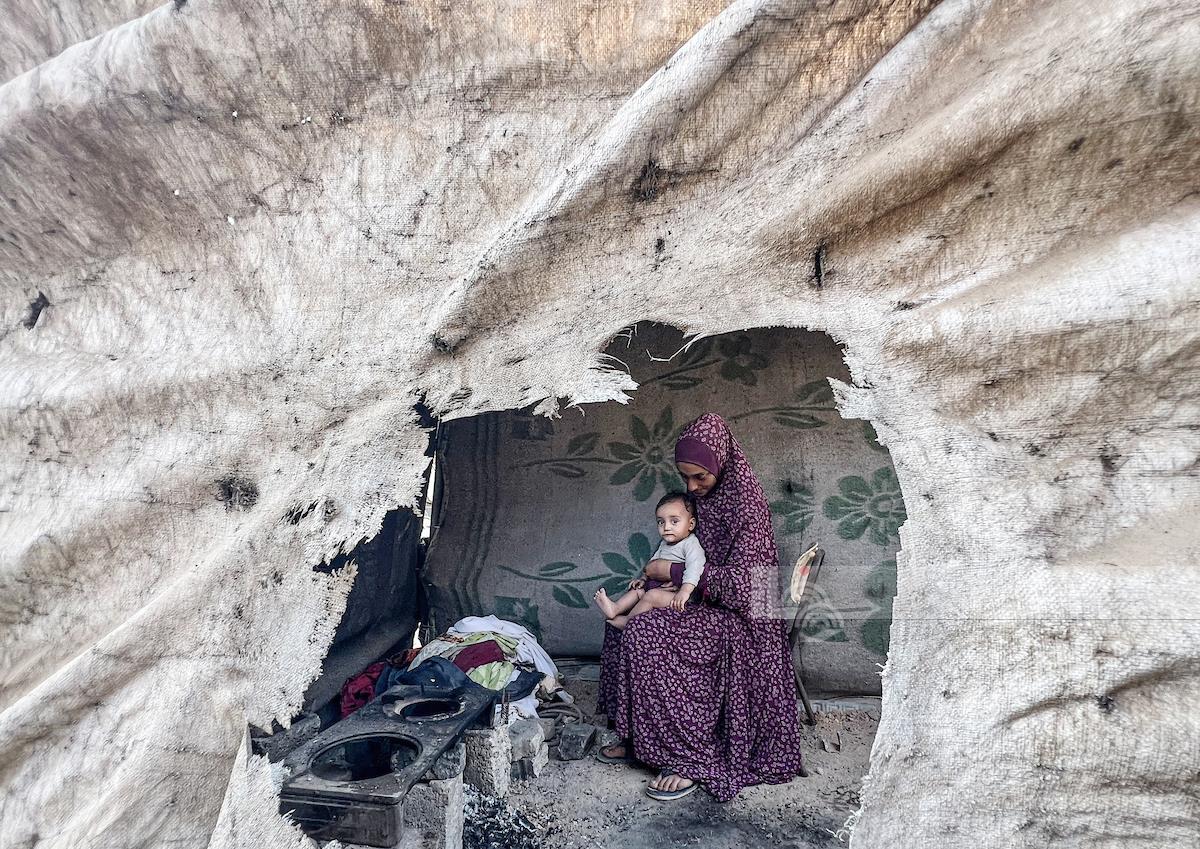RAMALLAH, Wednesday, November 8, 2023 (WAFA) – Minister of Health Mai Alkaila said today that only a trickle of the essential medical supplies has arrived in the Gaza Strip, calling for an immediate end to the month-long Israeli war on the besieged sea enclave.
Speaking at a press conference in Ramallah held in the presence of the Palestinian Red Crescent Society, the World Health Organization, the World Food Program, and a number of international and national health organizations and institutions, Alkaila stressed the need to urgently allow humanitarian and health supplies into the Gaza Strip, warning of the impact of the aggression on the health of the Palestinian population.
“The daily consumption of medicines and medical consumables during the aggression on the Gaza Strip is equivalent to the monthly consumption of the centers and hospitals in Gaza, and therefore the volume of supplies and trucks that crossed into the Gaza Strip is a drop in the ocean of the increasing medical needs as a result of the ongoing brutal aggression,” said the Health Minister.
“A whole month of killing, massacres and crimes. Children are still being killed in their beds or places of refuge. Pregnant mothers are killed along with their fetuses. There is no safe place in the Gaza Strip. Even hospitals that international law and international humanitarian law stipulate are protected, Israel violated their sanctity and killed the sick, wounded, displaced, and doctors in them. Ambulances were also bombed and doctors and patients in them were killed. Shelter centers were destroyed over the heads of those fleeing to them. The bloodshed is still happening... and the world is watching,” said the Health Minister.
“So far, there are more than 10,400 martyrs due to the ongoing Israeli bombing of the Gaza Strip and more than 25,000 wounded, many of them in critical condition. These numbers do not reflect reality, as a large number of bodies and wounded are still under the rubble,” she added.
“More than 70% of the martyrs were children, women and the elderly. As for the missing, the number reached about 2,350 civilians, including more than 1,300 children, which means that the death toll rises significantly as the days pass and the rubble is removed.”
Alkaila said that to date, 192 health personnel and 36 civil defense personnel were killed, and 50 ambulances were damaged, including 40 that stopped working completely. The number of hospitals that were out of service reached 18, out of 35 hospitals in the Gaza Strip, and 51 health centers out of 72 primary healthcare centers stopped working due to damage caused by the bombing or lack of fuel.
She pointed out the issue of the displacement of more than one and a half million people, equivalent to 70% of the population of the Gaza Strip. “They live homeless in shelter centers, schools, hospitals and public places that lack the minimum necessities of life, which threatens the spread of diseases and epidemics.”
There are also 350,000 patients suffering from non-communicable diseases such as diabetes, heart disease, cancer, and others, she said. There are at least 1,050 cases of kidney failure in need of daily and urgent dialysis, more than 2,000 cancer patients, and 130 newborns in incubators. There are more than 5,000 births per month in the Gaza Strip, and more than 50,000 pregnant women, who do not receive the necessary medical and health care, which puts their lives at risk, stressed the Health Minister.
She called for an immediate halt to the aggression against the Gaza Strip, allowing the entry of humanitarian and health supplies, the urgent exit of critically wounded and sick cases, and stopping the displacement of citizens from their homes.
As for the West Bank, said Alkaila, the situation over there is not any better as Israeli attacks continue.
“There is increasing pressure on the emergency capabilities of treatment centers due to the significant increase in the number of casualties among Palestinians as a result of assaults and attacks by the Israeli occupation forces and settlers. There is a high demand for emergency medical supplies in hospitals as well,” she said.
“The closure of Israeli occupation checkpoints, lack of safety and restrictions on movement, and attacks on health facilities and health personnel, all make the movement of ambulances difficult, as there is a restriction on the movement of health care workers and obstruction of patients’ access to primary care centers and hospitals between the cities of the West Bank and Jerusalem,” explained Alkaila, warning that parts of Area C of the West Bank, which is under full Israeli military control, are still inaccessible to partners running mobile clinics, leaving residents without access to basic healthcare services.
The Director General of the Palestinian Red Crescent Society (PRCS), Marwan al-Jilani, said that since last night, contact with Al-Quds Hospital, which is run by the PRCS, has been lost as a result of the bombing in its surroundings, indicating that the situation there is catastrophic.
The main center of the Red Crescent and the ambulance center in Jabalia were bombed in the first days of the aggression, and the volunteers and employees at the Jabalia center moved their operations to the clinics run by the United Nations Relief and Works Agency for Palestine Refugees (UNRWA) where they continue to work and treat the wounded despite the bombing, he said.
“The situation in Al-Quds Hospital has reached a critical stage as a result of the lack of fuel, water, and food. As of this morning, the hospital administration decided to stop the main generator after running out of fuel, which means that there is no electricity in the operating and intensive care rooms, and it has stopped pumping water in order to operate smaller generators to pump water, while using solar energy to provide electricity for vital matters in the hospital, keeping in mind that some of the solar panels have been bombed as well,” said Jilani.
He pointed out that since the first day of the aggression, no aid has reached the northern Gaza Strip, and yesterday there was a convoy of aid trucks, including two trucks that were supposed to arrive at Al-Quds Hospital but they were bombed, noting that the hospital accommodates, in addition to the sick and wounded, more than 14,000 displaced people.
He noted that any movement outside the hospital is directly targeted and that there are wounded people close to the hospital who cannot reach it, urging international health and relief organizations to urgently bring in humanitarian aid, essential needs, medical supplies, and fuel to Al-Quds Hospital and to the Gaza and North Gaza governorates.
Speaking on behalf of the World Food Program, Samer Abdul Jaber, its representative and country director in Palestine, said that the WFP is following the tragic humanitarian situation in the Gaza Strip, including the shortage of food, water, and sanitary materials.
"After a month of closures, the humanitarian catastrophe is worsening, as basic foodstuffs for every person become scarce, and bakeries and shops go out of business," he said, pointing out that WFP has worked since the first day to respond to emergency humanitarian needs and provide aid to more than 500,000 affected people in the Gaza Strip as it works to increase aid in the coming days.
Abdul Jaber stressed the importance of safe and sustainable entry for humanitarian aid, protecting civilians, and the urgent entry of fuel.
He pointed out that running out of fuel would lead to the cessation of the WFP's basic, life-saving services, and the deprivation of nearly 500,000 beneficiaries who depend on bread and canned food provided by the WFP in shelter centers and those displaced outside them.
Abdul Jaber stressed the importance of maintaining the Internet and telephone networks at all times, noting that the disruption of these networks leads to the cessation of the purchasing vouchers program, and affects the work of the institutions and communication with their staff and partners on the ground.
He warned of the continued deteriorating situation in the Gaza Strip, which will lead to all citizens in the Gaza Strip suffering from food insecurity, especially infants, pregnant and lactating women, and the elderly.
M.K.










